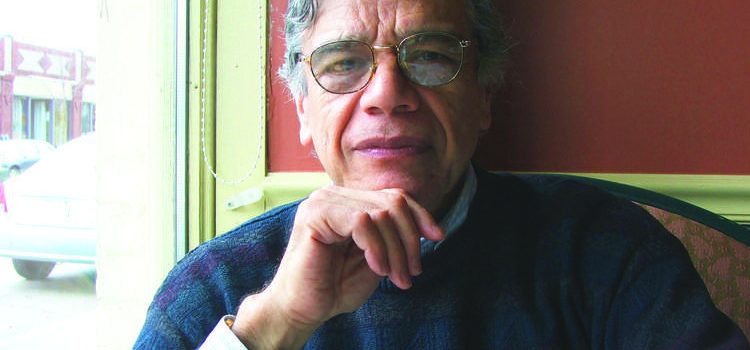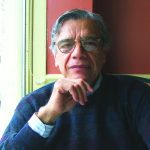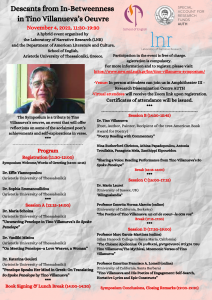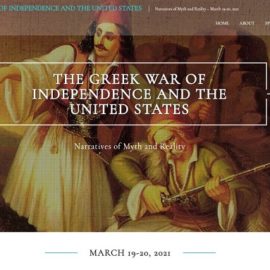The Laboratory of Narrative Research (LNR) is a teaching and research unit that is part of the School of English at Aristotle University of Thessaloniki. It has been designed to bring together scholars and researchers from across the humanities, the social sciences and other scientific fields who have a special interest in the workings and the politics of narrative production.
Lab Director: Dr Effie Yiannopoulou

Descants from in-Betweenness in Tino Villanueva’s Ouevre
November 4, 2022, 11:30-19:30
The Laboratory of Narrative Research in collaboration with the Department of American Literature and Culture, School of English, Aristotle University of Thessaloniki, Greece, are organizing a one-day symposium to honor acclaimed poet Tino Villanueva.
The Symposium is a hybrid event as it will run fully in-person and fully virtually to take advantage of the best that the two modalities can offer.
Venue
- In person attendees can join us in Amphitheater III – Research Dissemination Centre AUTH
- Virtual attendees will receive the Zoom link upon registration
All lectures will be delivered in English.
The official time zone for the event will be Greece time.
Participation in the event is free of charge.
Certificates of attendance will be issued.
For questions, please contact us on: lnr@enl.auth.gr or semma@enl.auth.gr.
A descant is a melodious counterpoint to the main vocal part of a performance. A descant is also discourse on a specific theme, often unfolding in defiance of canonical traditions. The Symposium is a tribute to Tino Villanueva’s oeuvre, an event that will offer reflections on some of the acclaimed poet’s achievements and self-explorations in verse.
TINO VILLANUEVA writes in both English and Spanish, and is the author of seven books of poetry, among them Shaking Off the Dark (1984); Crónica de mis años peores (1987) / Chronicle of My Worst Years (1994); Scene from the Movie GIANT (1993), winner of a 1994 American Book Award; and Primera causa / First Cause (1999), a chapbook on memory and writing. Villanueva has been anthologized in An Ear to the Ground: An Anthology of Contemporary American Poetry (1989), Poetas sin fronteras (2000), and most recently in The Norton Anthology of Latino Literature (2011). He has taught creative writing at the University of Texas–Austin, The College of William & Mary, and Bowdoin College. His art work has appeared on the covers and pages of national and international journals, such as Nexos, Green Mountains Review, TriQuarterly, Parnassus, and MELUS. His latest book of poems: So Spoke Penelope (2013) has been translated into Spanish, Así habló Penélope (2014), Italian, Così parlò Penelope (2017), French, Ainsi parlait Pénélope (2019), and Greek, Τάδε Έφη Πηνελόπη (2022). An anthology of his work has been translated into French, Anthologie de Poèmes Choisis (2015). One of his ekphrastic poems appears in the March 2016 issue of Poetry magazine. He recently retired from the Department of Romance Studies, Boston University.
Organizing Committee
- Sophia Emmanouilidou (semma@enl.auth.gr)
- Effie Yiannopoulou (yiannopo@enl.auth.gr)
- Lydia Efthymia Roupakia (roupakia@enl.auth.gr)
Program
Registration (11:30-12:00)
Symposium Welcome/Words of Greeting (12:00-12:15)
Dr. Effie Yiannopoulou

Assistant Professor of English Literature and Cultural Theory, Department of English Literature and Culture, Aristotle University of Thessaloniki, Greece.
Director of the Laboratory of Narrative Research, School of English, Aristotle University of Thessaloniki, Greece.
Dr Effie Yiannopoulou is Assistant Professor in English and Cultural Theory at the School of English, Aristotle University, Thessaloniki, Greece. She has co-edited a book entitled Metaphoricity and the Politics of Mobility. Amsterdam and New York: Rodopi (forthcoming) and special issues of The European Journal of English Studies [“Intimate Transfers,” 9.3 (2005)] and Gramma [“Wrestling Bodies,” 11 (2003)]. She is currently researching the intersection of whiteness and femininity in the work of white women writing around the middle of the twentieth century.
Web page: click here
Dr. Sophia Emmanouilidou

Department of American Literature and Culture, Aristotle University of Thessaloniki, Greece.
Dr. Sophia Emmanouilidou received her Ph.D. from the School of English, Aristotle University of Thessaloniki, Greece, with distinctions in 2003 and on a full scholarship from the Foundation of National Scholarships in Greece (IKY). She has been a Fulbright grantee at the University of Texas, Austin, and the John F. Kennedy Institute (JFKI) for North American Studies, Freie Universität of Berlin. She has published numerous articles on Chicana/o literature, identity-focused theories and ecocriticism. In 2020, she co-edited with Prof. Sezgin Toska the volume Transnational Interconnections of Nature Studies and the Environmental Humanities. She is currently the Program Coordinator of MESEA (The Society for Multi-Ethnic Studies: Europe and the Americas).
Session A (12:15-14:00)
Chair: Professor Zoe Detsi-Diamanti
This paper will read Tino Villanueva’s Penelope from his work So Spoke Penelope against her classical archetype, Homer’s “wise Penelope” («περίφρων Πηνελόπεια»), and will consider points of convergence and divergence between the Homeric character and Villanueva’s Penelopean text. My intent is to illustrate how Villanueva reimagines the mythic figure and how he challenges and revises the various aspects of Penelope’s representation in the Odyssey, such as her loyalty to Odysseus; her patience; her grief and desolate loneliness; her kleos; her desire; her dream thoughts and waking visions; her relation to goddess Athena; her attitude toward the suitors; her device of the web; her reunion with Odysseus. Drawing also on post-Homeric portrayals of Penelope that stress her gendered discourse and significance as an artist and weaver of stories, I will argue that Villanueva’s Penelope transforms the archetype into something larger and richer, which encompassesher complexity and fascination in new and exciting ways.
 Maria Schoina is Associate Professor of English Literature in the School of English of Aristotle University of Thessaloniki where she teaches courses on English Romanticism, Gothic literature and Travel Writing. She is the author of Romantic “Anglo-Italians”: Configurations of Identity in Byron, the Shelleys, and the Pisan Circle (Ashgate 2009; Routledge 2016, paperback 2019). Her essays and reviews have appeared in journals such as Romanticism, The Byron Journal, The Wordsworth Circle, European Romantic Review, Notes and Queries and in edited collections. Her most recent publications include an essay on Mary Shelley’s Greek studies in The Keats-Shelley Review (2019), a chapter on the Pisan Circle and the Cockney School in Byron in Context (Cambridge UP, 2020) and a chapter on Byron’s reviewers for the Oxford Handbook of Lord Byron (forthcoming). She is currently co-editing (with Alexander Grammatikos) a collection on Byron and Translation (to be published by Liverpool UP).
Maria Schoina is Associate Professor of English Literature in the School of English of Aristotle University of Thessaloniki where she teaches courses on English Romanticism, Gothic literature and Travel Writing. She is the author of Romantic “Anglo-Italians”: Configurations of Identity in Byron, the Shelleys, and the Pisan Circle (Ashgate 2009; Routledge 2016, paperback 2019). Her essays and reviews have appeared in journals such as Romanticism, The Byron Journal, The Wordsworth Circle, European Romantic Review, Notes and Queries and in edited collections. Her most recent publications include an essay on Mary Shelley’s Greek studies in The Keats-Shelley Review (2019), a chapter on the Pisan Circle and the Cockney School in Byron in Context (Cambridge UP, 2020) and a chapter on Byron’s reviewers for the Oxford Handbook of Lord Byron (forthcoming). She is currently co-editing (with Alexander Grammatikos) a collection on Byron and Translation (to be published by Liverpool UP).Web page: click here
 Vasiliki Misiou is Assistant Professor in the Department of Translation and Intercultural Studies at the School of English, Aristotle University of Thessaloniki, Greece. Over the last years, she has offered undergraduate and graduate courses in the fields of literary translation, theatre translation, and translation theory. As a professional translator she has collaborated with several institutions and publishing houses. Her research interests revolve around literary translation, theatre translation, gender and/in translation, feminist approaches to literature and translation, paratexts and translation, as well as translation and semiotics.
Vasiliki Misiou is Assistant Professor in the Department of Translation and Intercultural Studies at the School of English, Aristotle University of Thessaloniki, Greece. Over the last years, she has offered undergraduate and graduate courses in the fields of literary translation, theatre translation, and translation theory. As a professional translator she has collaborated with several institutions and publishing houses. Her research interests revolve around literary translation, theatre translation, gender and/in translation, feminist approaches to literature and translation, paratexts and translation, as well as translation and semiotics.Web page: click here
The overall topic as well as the sheer content of Tino Villanueva’s poem collection ‘So Spoke Penelope’ have foregrounded the need to approach the process of translation on multiple and intertwined levels. On a semantic level we reflect on the linguistic and cultural elements that have been taken into consideration while rendering these poetic texts into Greek, the mother tongue of both the new readership and queen Penelope, discussing the various strategies employed. Our analysis then focuses on how the poem collection, also sets out to delight the audience in its well-orchestrated stylistic manners that lend the poem its rhythm and tonality as echoes of eptanisian sounds and musicality. On a pragmatic level, we sought to grasp and re-encode the overall communicative and emotional impact on the reader especially since themes of absence, love, despair, anger and hope have been central and recurrent throughout Villanueva’s collection. Finally, we illustrate our translation choices, pondering on the normative level and on how “So Spoke Penelope” is placed within the contemporary literary and cultural context.
 Katerina Gouleti is currently affiliated with the Department of Translation and Intercultural Studies at School of English as a Laboratory Teaching Fellow. She has been offering courses at undergraduate and postgraduate level since 2006 in the field of Audiovisual Translation and Translation of General and Specialized Texts. She holds a PhD with distinctions on Audiovisual Translation and she received an EU scholarship for postgraduate studies at DFLTI, Ionian University, specializing in Translation and New Technologies. As a professional translator and subtitler she has been the coordinator for the production of sub/surtitling projects for several state institutions (Biennale of Contemporary Art) and museums (Benaki, Momus Thessaloniki), festivals (Dimitria Festival of Thessaloniki, In-Edit, TIFF, LGBT Thess International, Select Respect, Aegean Festival/Niarchos Foundation) and private subtitling companies. Her research interests and publications revolve largely around audiovisual media and translation within the scope of intercultural studies and teaching.
Katerina Gouleti is currently affiliated with the Department of Translation and Intercultural Studies at School of English as a Laboratory Teaching Fellow. She has been offering courses at undergraduate and postgraduate level since 2006 in the field of Audiovisual Translation and Translation of General and Specialized Texts. She holds a PhD with distinctions on Audiovisual Translation and she received an EU scholarship for postgraduate studies at DFLTI, Ionian University, specializing in Translation and New Technologies. As a professional translator and subtitler she has been the coordinator for the production of sub/surtitling projects for several state institutions (Biennale of Contemporary Art) and museums (Benaki, Momus Thessaloniki), festivals (Dimitria Festival of Thessaloniki, In-Edit, TIFF, LGBT Thess International, Select Respect, Aegean Festival/Niarchos Foundation) and private subtitling companies. Her research interests and publications revolve largely around audiovisual media and translation within the scope of intercultural studies and teaching.Web page: click here
Book Signing & Lunch Break (14:00-14:30)
Session B (14:30-15:45)
Chair: Dr. Vasiliki Misiou
Most writers, at the start of their writing careers, fall under the influence of some established writer. Thus, in sound and sense, the first literary efforts by novice writers resemble those of the writer they admire. In my case I wrote mimetic poems which strived to sound like those of Dylan Thomas. These poems à la Dylan Thomas, I learned much about technique, and it proved to be a useful exercise for the writing of poetry, and finding my own voice. This and other autobiographical notes will be part of my poetry reading, including historical, literary, and aesthetic references as well.
 TINO VILLANUEVA writes in both English and Spanish, and is the author of seven books of poetry, among them Shaking Off the Dark (1984); Crónica de mis años peores (1987) / Chronicle of My Worst Years (1994); Scene from the Movie GIANT (1993), winner of a 1994 American Book Award; and Primera causa / First Cause (1999), a chapbook on memory and writing. Villanueva has been anthologized in An Ear to the Ground: An Anthology of Contemporary American Poetry (1989), Poetas sin fronteras (2000), and most recently in The Norton Anthology of Latino Literature (2011). He has taught creative writing at the University of Texas–Austin, The College of William & Mary, and Bowdoin College. His art work has appeared on the covers and pages of national and international journals, such as Nexos, Green Mountains Review, TriQuarterly, Parnassus, and MELUS. His latest book of poems: So Spoke Penelope (2013) has been translated into Spanish, Así habló Penélope (2014), Italian, Così parlò Penelope (2017), French, Ainsi parlait Pénélope (2019), and Greek, Τάδε Έφη Πηνελόπη (2022). An anthology of his work has been translated into French, Anthologie de Poèmes Choisis (2015). One of his ekphrastic poems appears in the March 2016 issue of Poetry magazine. He recently retired from the Department of Romance Studies, Boston University.
TINO VILLANUEVA writes in both English and Spanish, and is the author of seven books of poetry, among them Shaking Off the Dark (1984); Crónica de mis años peores (1987) / Chronicle of My Worst Years (1994); Scene from the Movie GIANT (1993), winner of a 1994 American Book Award; and Primera causa / First Cause (1999), a chapbook on memory and writing. Villanueva has been anthologized in An Ear to the Ground: An Anthology of Contemporary American Poetry (1989), Poetas sin fronteras (2000), and most recently in The Norton Anthology of Latino Literature (2011). He has taught creative writing at the University of Texas–Austin, The College of William & Mary, and Bowdoin College. His art work has appeared on the covers and pages of national and international journals, such as Nexos, Green Mountains Review, TriQuarterly, Parnassus, and MELUS. His latest book of poems: So Spoke Penelope (2013) has been translated into Spanish, Así habló Penélope (2014), Italian, Così parlò Penelope (2017), French, Ainsi parlait Pénélope (2019), and Greek, Τάδε Έφη Πηνελόπη (2022). An anthology of his work has been translated into French, Anthologie de Poèmes Choisis (2015). One of his ekphrastic poems appears in the March 2016 issue of Poetry magazine. He recently retired from the Department of Romance Studies, Boston University. Break (15:45-16:00)
Session C (16:00-17:15)
Chair: Dr. Lydia Efthymia Roupakia
In his ‘Brief History of Bilingualism in Poetry’ Tino Villanueva makes a distinction between ‘bookish’ and ‘lived’ multilingualism(709) that has shaped my thinking about and theorisation of multilingual writing and reading. This is because the ‘bookish’ and the ‘lived’ roughlycorrespond to two distinct traditions or genealogies or practices of multilingual poetry in the twentieth (and possibly the twenty-first) century: the modernist one of Eliot and Pound and themulticultural other of migrant or minority writers. But it is not a firm distinction: in placing himself in a long line of American writers whose first language was not English, such as Gertrude Stein, Louis Zukofsky, and Phillis Wheatley, Villanueva characteristically merges the modernist-multilingual with the migrant tradition, thus undoing, in his own praxis and theory, the very distinction he has observed in American poetry and creating something new. For to live in multicultural America, he notes, is ‘to live in bilingualandia’, a neologism whose very construction—the Hispanicization of ‘bilingual’ and ‘land’--exemplifies the joining (rather than the ‘in-between’) sensibility of his poetics. (‘The breath is alive’ 169). Close readings of early poems, ‘Day- long Day’ and ‘Que Hay Otra Voz’ from Hay Otra Voz and a later one, ‘Convocatión de Palabras’ from Crónica de Mis Años Peores show how in Villanueva’s praxis the bookish and the lived, like Spanish and English, do not merely co-exist but meld, to make poetry together.
 Maria Lauret is Visiting Professor of American Literature and Culture at the University of Sussex, where she taught American Studies from 1995 until 2021. Her publications on bi- and multilingual literature include the monograph Wanderwords: Language Migration in American Literature and a forthcoming contribution to the Bloomsbury Handbook of American Poetry (eds. Craig Svonkin and Stephen Gould Axelrod) entitled ‘Multilingual American Poetry and Poetics’. She is currently writing a monograph on African American Literature in the Age of #BlackLivesMatter.
Maria Lauret is Visiting Professor of American Literature and Culture at the University of Sussex, where she taught American Studies from 1995 until 2021. Her publications on bi- and multilingual literature include the monograph Wanderwords: Language Migration in American Literature and a forthcoming contribution to the Bloomsbury Handbook of American Poetry (eds. Craig Svonkin and Stephen Gould Axelrod) entitled ‘Multilingual American Poetry and Poetics’. She is currently writing a monograph on African American Literature in the Age of #BlackLivesMatter. My meditation will explore the sociopolitical idea of otherness as it emerges from his first published work to the last. Villanueva’s poetics surged more than 50 years ago with the claim of living an existence transformed into alienness in his own land. What estranged him? Is it an individual condition? Who is the imaginary speaker? What is his/her situatedness? Who is the targeted listener/reader? Why refer to himself as a Chicano? Is it the beginning of disalienation? And what do colonizations have to do with it?
 Norma Alarcón is Professor Emerita of Ethnic Women, Gender and Sexuality Studies, at the University of California, Berkeley. She was publisher and editor of THIRD WOMAN PRESS (1979-2004), a journal for women of color. She published a book in Spanish on the Mexican writer Rosario Castellanos, with a focus on her poetry production. She also has a forthcoming book in English collecting most of her essays. It is titled, Forced by Circumstance: Collected Feminist Essays (1981-2022).
Norma Alarcón is Professor Emerita of Ethnic Women, Gender and Sexuality Studies, at the University of California, Berkeley. She was publisher and editor of THIRD WOMAN PRESS (1979-2004), a journal for women of color. She published a book in Spanish on the Mexican writer Rosario Castellanos, with a focus on her poetry production. She also has a forthcoming book in English collecting most of her essays. It is titled, Forced by Circumstance: Collected Feminist Essays (1981-2022). Break (17:15-17:30)
Session D (17:30-19:00)
Chair: Dr. Theodora Patrona
Classical scholars have noted that the writing of the ancient Greek poet Apollonius of Rhodes is characterized by its allusive “cultural mnemonics” and its connections to a “mytho-historical” past. The work of Apollonius, it is observed, represents “imaginative transports in time” through his use of allusive figurations and memory that serve as a marker of a particular “intertextual temporal sensibility”. Thousands of years later, the writings of the modern Chicano poet Tino Villanueva more than echo his artistic Hellenic predecessor. Indeed, we find in Villanueva’s verse very specific cultural mnemonics as well as allusions to a broader collective mytho-historical perspective that embodies those “imaginative transports in time.” In Villanueva’s work, allusive memory is a central theme, a central metaphor, and the central apparatus that turns a solitary act of remembrance into a decidedly shared experiential linguistic phenomenon. From painful aesthetic reminiscences of a Mexican-American youth in a Texas town to an unexpected re-imagining of an ancient Greek epic, this succinct presentation shall probe the mythical, mnemonic nature of Villanuevan poetics.
 Marc García-Martínez is a Professor of English at Allan Hancock College in Santa María, California, and previously a Lecturer in the Department of Chicana/o Studies at the University of California at Santa Barbara. He is the co-editor of A Critical Collection on Alejandro Morales: Forging an Alternative Chicano Fiction (University of New Mexico Press, 2021), and the author of The Flesh-and-Blood Aesthetics of Alejandro Morales: Disease, Sex, and Figuration (San Diego State University Press). The grandson of immigrants from the Sonora and Colima regions of Mexico, he is the originator and coordinator of Hancock College’s Latina/o Studies Program
Marc García-Martínez is a Professor of English at Allan Hancock College in Santa María, California, and previously a Lecturer in the Department of Chicana/o Studies at the University of California at Santa Barbara. He is the co-editor of A Critical Collection on Alejandro Morales: Forging an Alternative Chicano Fiction (University of New Mexico Press, 2021), and the author of The Flesh-and-Blood Aesthetics of Alejandro Morales: Disease, Sex, and Figuration (San Diego State University Press). The grandson of immigrants from the Sonora and Colima regions of Mexico, he is the originator and coordinator of Hancock College’s Latina/o Studies Program Tino Villanueva stands out as a poet who has indulged extensively in giving voice to the downtrodden, particularly Chicanos who have had to search for their identity primarily in a Texas Anglo culture. He consistently looks back to his migrant origins to understand the power dynamics, while discovering simple folk (i.e. a family member, a relative, a friend) who instill in him strength of character. Also, he constantly returns to the times as a boy when he was encountering and developing self. Much later he incurred into thorny issues of race as found in the film Giant(originally from l956) which for him was a watershed of realizing he was a social outcast. This heightened his conscientiousness and awareness which serves as an example on how to cope for other Chicanos. I will start with his more social poems, follow him through some lyrical moments and end with his more speculative poetry of which So Spoke Penelopeis a prime example.
 Francisco A. Lomelí is a Distinguished Emeritus Professor in the fields of Latin American literature and Chicano/a literature and culture. He worked at the University of California at Santa Barbara for 42 years as part of the Chicano/a Studies and Spanish and Portuguese Departments. His main areas of interest are: Chicano novel, literary history, Southwestern culture, border studies, Spanglish, and Latin American literature (Mexico, Argentina, Central America and Chile). He has 40 books to his credit,including highly disseminated reference books (i.e. Dictionary ofLiterary Biography: Chicano Writers [1989, 1993 and 1999 with Carl Shirley], Handbook of Hispanic Cultures in the United States: Literature and Art[1993], Nuevomexicano Cultural Legacy: Forms, Agencies & Discourse [2002 with Víctor Sorell and Genaro Padilla], Historical Dictionary of U.S. Latino Literature [2018 with DonaldoUrioste and María J. Villaseñor], Routledge Handbook of Chicana/o Studies [2019 with Denise Segura and Elyette Benjamin-Labarthe] and Human Rights in the Americas [2021 with María Herrera-Sobek and Luz A. Kirschener]. He has also produced other works that are either monographic or are archival recoveries, such as La novelística de Carlos Droguett: poética de la obsession y elmartirio[1984], Defying the Inquisition in Colonial New Mexico: Miguel de Quintana’s Life and Writings [2006 with Clark Colahan], The Writings of Eusebio Chacón[2012 with Gabriel Meléndez], A Critical Collection on Alejandro Morales: Forging an Alternative Chicano Fiction [2021 with Marc García-Martínez]. He has also produced numerous translations, such as Barrio on the Edge [1998], and bibliographies in Chicano Perspectives in Literature: A Critical and Annotated Bibliography [1976]. In addition, he is an elected member of the North American Academy of the Spanish Language.
Francisco A. Lomelí is a Distinguished Emeritus Professor in the fields of Latin American literature and Chicano/a literature and culture. He worked at the University of California at Santa Barbara for 42 years as part of the Chicano/a Studies and Spanish and Portuguese Departments. His main areas of interest are: Chicano novel, literary history, Southwestern culture, border studies, Spanglish, and Latin American literature (Mexico, Argentina, Central America and Chile). He has 40 books to his credit,including highly disseminated reference books (i.e. Dictionary ofLiterary Biography: Chicano Writers [1989, 1993 and 1999 with Carl Shirley], Handbook of Hispanic Cultures in the United States: Literature and Art[1993], Nuevomexicano Cultural Legacy: Forms, Agencies & Discourse [2002 with Víctor Sorell and Genaro Padilla], Historical Dictionary of U.S. Latino Literature [2018 with DonaldoUrioste and María J. Villaseñor], Routledge Handbook of Chicana/o Studies [2019 with Denise Segura and Elyette Benjamin-Labarthe] and Human Rights in the Americas [2021 with María Herrera-Sobek and Luz A. Kirschener]. He has also produced other works that are either monographic or are archival recoveries, such as La novelística de Carlos Droguett: poética de la obsession y elmartirio[1984], Defying the Inquisition in Colonial New Mexico: Miguel de Quintana’s Life and Writings [2006 with Clark Colahan], The Writings of Eusebio Chacón[2012 with Gabriel Meléndez], A Critical Collection on Alejandro Morales: Forging an Alternative Chicano Fiction [2021 with Marc García-Martínez]. He has also produced numerous translations, such as Barrio on the Edge [1998], and bibliographies in Chicano Perspectives in Literature: A Critical and Annotated Bibliography [1976]. In addition, he is an elected member of the North American Academy of the Spanish Language. 





